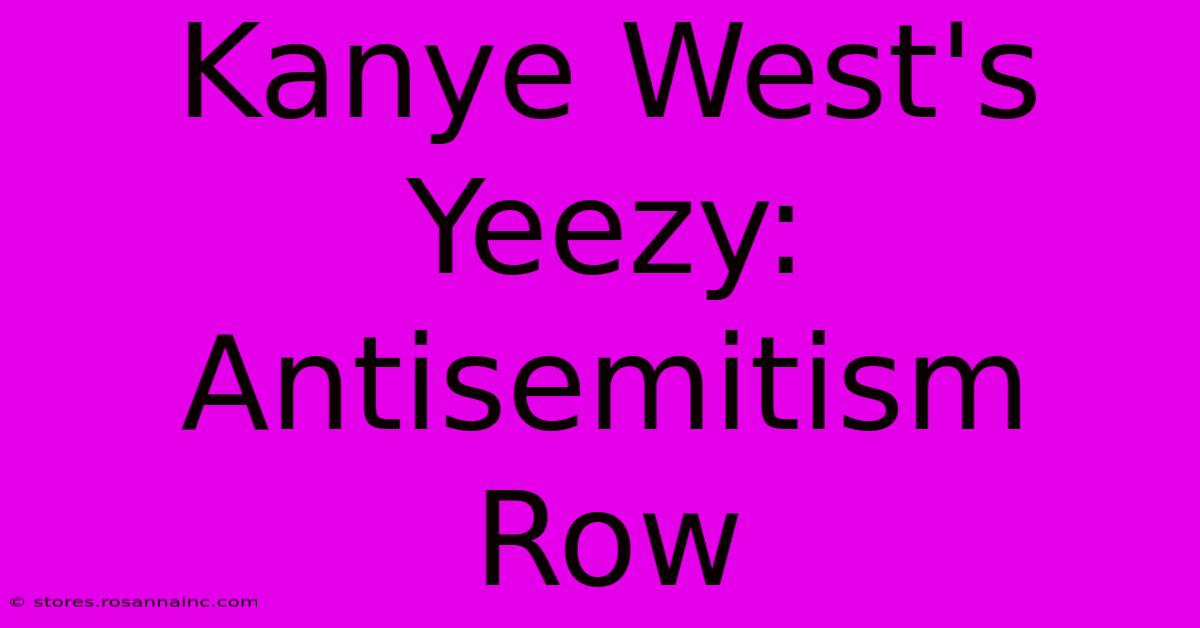Kanye West's Yeezy: Antisemitism Row

Table of Contents
Kanye West's Yeezy: The Antisemitism Row and its Fallout
Kanye West, now legally known as Ye, has built a global empire through his music and fashion brand, Yeezy. However, in recent years, his controversial statements and actions have overshadowed his achievements, culminating in a significant backlash and widespread condemnation for his antisemitic remarks. This article delves into the controversy, its impact on Ye's career and brand, and the broader implications of his actions.
The Genesis of the Controversy
The antisemitism row didn't erupt overnight. It was a gradual escalation of increasingly inflammatory statements and actions. Initially, seemingly innocuous comments sparked concerns, but they quickly escalated into explicit antisemitic tropes and conspiracy theories. These included:
- Tweets suggesting Jewish people controlled the media and were manipulating narratives against him. This was a particularly damaging claim, echoing historical antisemitic propaganda.
- Public statements declaring his intent to go "death con 3" on Jewish people. This blatant threat of violence caused widespread outrage and fear.
- Collaboration with known antisemites and the promotion of antisemitic content. These actions further amplified his harmful messages and showed a disregard for the consequences.
These actions weren't isolated incidents but rather part of a pattern of behavior that demonstrated a clear disregard for the impact of his words and actions on the Jewish community and society as a whole.
The Impact on Yeezy and Adidas
The consequences for Ye's business ventures were swift and severe. Adidas, a major partner in the Yeezy brand, terminated their collaboration, citing Ye's repeated violations of their contract and values. This decision had enormous financial implications for both Ye and Adidas, resulting in significant losses for both parties. The severing of ties symbolized a broader societal rejection of antisemitism and a determination to hold those perpetuating such hatred accountable.
This situation highlighted the potential risk of associating with individuals prone to controversial statements and actions. Brands now face increased scrutiny and pressure to distance themselves from figures who engage in hateful rhetoric.
The Broader Implications
Ye's actions transcend the realm of celebrity gossip. His antisemitic comments fueled real-world consequences, including:
- A rise in antisemitic incidents. Studies have shown a correlation between public figures expressing antisemitic views and an increase in antisemitic hate crimes and harassment. This highlights the dangerous power of rhetoric and its ability to inspire real-world violence.
- Damage to the fight against antisemitism. Ye's pronouncements undermined efforts to combat antisemitism and promote tolerance. His platform allowed him to reach a vast audience and spread harmful ideologies.
- Questions about accountability for public figures. The controversy sparked important discussions about the responsibility of powerful individuals to use their platforms responsibly and the consequences of failing to do so.
The Kanye West/Yeezy situation served as a stark reminder of the enduring presence of antisemitism and the need for constant vigilance in combating it.
The Ongoing Debate
The fallout from Ye's actions continues to unfold. There are ongoing discussions about the impact of his statements, the best ways to combat antisemitism, and the responsibility of social media platforms in moderating harmful content. His case raises important questions about free speech versus the promotion of hate speech. The line between expression and incitement remains a critical area of debate. It's a complex and multifaceted issue with no easy answers.
In conclusion, Kanye West's antisemitism controversy represents a significant moment in contemporary culture. It highlights the destructive power of hate speech, the importance of corporate responsibility, and the ongoing struggle against antisemitism. The long-term consequences of Ye's actions are still unfolding, but his story serves as a cautionary tale for both individuals and institutions. The focus now shifts to healing and building a more inclusive and tolerant society.

Thank you for visiting our website wich cover about Kanye West's Yeezy: Antisemitism Row. We hope the information provided has been useful to you. Feel free to contact us if you have any questions or need further assistance. See you next time and dont miss to bookmark.
Featured Posts
-
Did Ozzy Osbourne Die Dispelling The Myths
Feb 11, 2025
-
El Impacto De Las Elecciones De 2024 En Wisconsin
Feb 11, 2025
-
Joe Thomas Comments On Garrett Trade
Feb 11, 2025
-
Molly Shannons Best From Snl To Superstardom
Feb 11, 2025
-
Ligue 2 Defaite Du Stade Malherbe Caen
Feb 11, 2025
